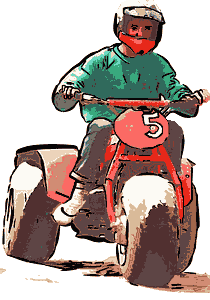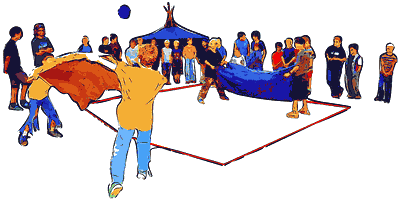source: www.youthwork-practice.com | 2000 Games, Devotions, Themes, Ideas and more for Youth Work
only for private using
Youth Worker Training and Skills


Whoever finds himself in youth work for children or adolescents needs Know-How and appropriate training in group pedagogy, law, play pedagogy and and and. One should learn various leadership styles, be able to recognize group processes and simply acquire a basic knowledge. The contents that are introduced here do not replace a youth worker training (basic or advanced courses), but give at least a few theoretical and many practical tips in dealing with children and adolescents. Successful und consistent youth work depends lastly on commitment, and the abilities, goals, and personal interests of the youth worker.
Youth Work
-
 About Youth Work and these pages
About Youth Work and these pagesLead-in: Youth work means working with young people outside of their homes and schools. Dealing with young people has to be learned. Understanding youth is an art. Shaping young people, the social approach, their need for orientation is a task with ups and downs. Aim of this website is, to share information, advice and reflection; topics for co-workers as well as important points for qualification and training of youth workers. Those are the issues I will discuss here.
-
 Characteristics of youth work and working with youths
Characteristics of youth work and working with youthsYouth work is a collective term for all educational activities that relate to young people. Those activities are made available neither through parents or family but through a (qualified) youth worker. The three pillars of education are: family, school, youth work.
-
 Christian Youth Work
Christian Youth WorkHere I will discuss: What is Christian youth work? What are the goals of Christian youth work? What content do we want to convey? How does Christian-oriented youth work differ from other youth work?
-
 Types of Youth and Group Work
Types of Youth and Group WorkThere are many different forms of youth work. Youth centres, churches, sports clubs, and music clubs – they all provide various opportunities for young people to engage with others and spend their leisure time meaningful. Every young person is looking for his place (in society) where he feels comfortable, understood and receives confirmation. If a youth worker has no goals, content or is lacking commitment, inevitably, he will experience, that the group members will stop coming, therefore, he also will lose his drive and desire for his youth work over time.
The Youth Leader
-
 Youth leader – Group leader
Youth leader – Group leaderThe success of a youth leader is reflected in his qualifications, qualities, engagement, personal talents and last but not least, his team spirit.
-
 Authority: How do I become authoritative? How I lose my authority?
Authority: How do I become authoritative? How I lose my authority?Authority is the respect, the authority, due to external powers and personal superiority. In this article I will explain how you can gain authority, however, I will also show you how you can lose your authority.
-
 Empowerment as a youth leader
Empowerment as a youth leaderLooking at it from a Christian perspective your authority is given you by proxy. God is behind you and gives you his full power.
-
 Youth Pastor and pastoral work
Youth Pastor and pastoral workSome of the qualities of a youth worker in the Christian frame work are: he is kind and outgoing, determined, is a very good listener and able to hear what is said between the lines. The chaplain is a role model solely by his behaviour and the way he conducts his life.
-
 Youth leader: Challenged - overwhelmed – challenging
Youth leader: Challenged - overwhelmed – challengingThe youth worker, on the one hand, is the one who challenges; yet, on the other hand, he is also challenged at the same time. It can happen, sometimes really quickly, that a youth worker gets overwhelmed.
-
 Different Leadership Styles - Test your Leadership Style
Different Leadership Styles - Test your Leadership StyleInevitably, each youth worker has their own style, which he will apply in his work. The respective leadership style will be determined by the worker’s personality, the group (age, unisexual / co-educational groups, arrangement and duration of the group) as well as the particular program. However, there are 3 types of leadership styles, each with its own advantages and disadvantages. At the end you will find a test to find out about your own leadership style.
-
 Qualities and Characteristics of a Youth Leader
Qualities and Characteristics of a Youth LeaderQualities / characteristics of a youth worker: How should a youth worker conduct or not conduct himself? What does it mean to be a youth worker? Initially, many young people or young adults are fascinated by the idea to work as a responsible employer in the field of youth work. However, many are not aware of what that entails and that there is more to it than just giving 90 minutes of their time each week and then get quickly over with the program.
-
 FIT for kids = Friendship, Inspiration and Training
FIT for kids = Friendship, Inspiration and TrainingNo pain, no gain - no training, no master, (as an old proverb says). Qualitative good training of staff is an important factor. The making or braking of each work place is a creative, operational and successful team. They are not officials fulfilling a specific task. These are the people who are connected to each other in a friendly and encouraging way as well as complement each other with their different gifts.
-
 Tips for committed integrated youth work
Tips for committed integrated youth workNo pain, no gain - no training, no master, (as an old proverb says). Qualitative good training of staff is an important factor. The making or braking of each work place is a creative, operational and successful team. They are not officials fulfilling a specific task. These are the people who are connected to each other in a friendly and encouraging way as well as complement each other with their different gifts.
-
 Analysis: Feedback questions for staff members
Analysis: Feedback questions for staff membersAnalysis of your youth work. The questions are in place to encourage you to think about yourself and the group plus to get in touch with each other.
The Youth Group and the Program
-
 Youth groups and Group pedagogic
Youth groups and Group pedagogicYouth group - what is this? The group education for children and young people is concerned with the issues of how to form and lead a group. Every youth worker has to get to know the group processes of his own youth group. The aim is to foster a “WE – feeling” instead of a “ME - YOU feeling”. It can take a very long time for a group to melt into each other. The stage of “keeping my distance” is followed by a phase of getting closer. Growing together, moving towards each other, building relationships and share experiences.
-
 Group pedagogic and the different age levels
Group pedagogic and the different age levelsA brief outline of the group education and the different stages of development for children and young people from 3-15 year of age.
-
 Distribution of roles: Boys and Girls roles within the group
Distribution of roles: Boys and Girls roles within the groupIn every group, each member receive a certain role. Those roles are partially defined, assigned but also copied form other adults in the young person’s life.
-
 Conflicts and Rules
Conflicts and RulesRules can help only so far and they cannot avoid every conflict. The rules, their implementation and subsequent justification has to be carefully thought through. Conflicts of young people within themselves, with friends, their faith, awaken question in the young person about themselves, the meaning of life, goals, trust, affection and love. It is not unusual, that the process of finding oneself and the assumed inferiority that often comes with it, are compensated with behaviours, such as, showing off, coolness and copying the behaviour of others. (Peer pressure).
-
 Group processes and different phases of a group
Group processes and different phases of a groupEach youth group goes through various stages. Beginning with the process of development to the stage of re-orientation, all group processes are described here briefly.
Game Pedagogy and Know How
-
 Games and method competence
Games and method competenceWhat good is a game collection with over 2500 games if you do not know how to play games and also lack the necessary methodological expertise? On these pages you find a few ideas to the educational value of games right through to cooperative adventure games. There are also recommendations for a well-equipped toy box and which games you can play with them.
-
 Game Pedagogy | Game Education
Game Pedagogy | Game EducationThe game education contains of important features which often match real life situations. They are reflected in a playful manner. In there lies the importance of playing. It promotes social behaviour and confrontation with oneself. Those are skills we can convey to children and young people to take with them. It is often said, in a very lightly way, I may say, that “Life is a Game”. However, games mirror some important aspects of human coexistence.
-
 The Necessity of Playing Games
The Necessity of Playing GamesMost of us adults no longer play games. And when I say play games I am not talking about video games. I’m talking about the ones that require physical actions such as running, jumping, carrying objects, passing and strategy.
-
 Games seminar – workshop: Learning to play.
Games seminar – workshop: Learning to play.This contribution was made by a Games Workshop for full-time employees in the field of youth work within the religious context. Many of the games here included are also in the games section. However, for this publication the main focus is more on the compilation and the subsequent evaluation/feedback. Learning to play, recognizing moments to use games as a tool and then implement them correctly in the context of this particular group is paramount for the youth worker. These are the moments, where our experience comes into force, where we intuitively choose the right games, weighing up and including all strong points and weaknesses alike.
-
 Planning Group Gathering
Planning Group GatheringEach group meeting is an opportunity. The better the group meetings are prepared, the more likely it becomes that the meeting becomes and event and a highlight in the young person’s life. However, there is no recipe for success and no collection of tips, which will guarantee the success of your planned group meetings. Nonetheless, if you read this article and keep a "goal-oriented" approach, most likely, it will work.
-
 Cooperative Adventure Games
Cooperative Adventure GamesWith cooperative adventure games, we are challenging self-confidence, courage, and skill, as well as promote independent thinking and the ability to communicate with one another. It can happen, that the one or the other realizes unknown abilities and starts to “blossom”, which can lead to a new group dynamic. Cooperation replaces competition.
-
 Standard contents for a general games case
Standard contents for a general games caseA practical and indispensable tool for all practitioners in the youth work sector is a bag of methods and a well-equipped toy box. These tools, so to speak, give you the opportunity to improvise and spontaneously play several games off the cuff.
-
 Youth Work: publicity work and advertisement
Youth Work: publicity work and advertisementHe, who does not advertise, will be forgotten. Do well and talk about it. Use the newspaper, create a home page, print flyers, hang up posters – bring attention to your youth group.
Planning camps and activities
-
 Planning and Organisation of events or camps
Planning and Organisation of events or campsPlanning and organization for times of recreation; fundamental considerations, goals, recreation awards, advertising, etc. For example, a hiking trip, per foot or by bike, requires a different organization than a camp or leisure time in a cottage. The daily routine, the program and its content, the emphasis on “living together” during your fee time require different planning and considerations.
-
 Pack list: Suggestion for a hike or camp
Pack list: Suggestion for a hike or campSuggestion for a checklist – a list of all things to bring for a hiking trip, a weekend or longer camp. Help and checklist!
 First Aid respectively what belongs into a camping First Aid Kit
First Aid respectively what belongs into a camping First Aid KitWhether on a camp, a hiking holiday or during a sporting event a well-stocked first aid kit must be part of every outing with children and adolescents.
-
 Boys and Girls: Mixed sleeping arrangements on youth camps
Boys and Girls: Mixed sleeping arrangements on youth campsMixed sleeping is always a hot topic in coeducational youth camps. There is just no way to get around. Another difficulty is, to make yourself rather unpopular by taking up this hot issue. Many youth workers shy away or are unsure how to deal with this issue. Therefore it is important to us, that you first read through the provided text and then find out where are you on this matter.
-
 Myself and the (woeful) subject – alcohol
Myself and the (woeful) subject – alcoholAlcohol is another one of those issues we have to confront when it comes to young people and camps. As a rule of the thumb, this issue starts with roughly 14 years of age. The issue is always the same. How is the youth worker supposed to handle this? Should alcohol be a taboo for all participants? Is the camp quality likely to suffer in the presence of alcohol? It is paramount that every youth worker has a clear standing on this topic. Otherwise, it is all too easy for the matter to get out of hand.
-
 Cigarettes: Smoking on camp and how we deal with this.
Cigarettes: Smoking on camp and how we deal with this.The fag often interferes with youth work. Sometimes it is the 13 or even 12-year-old participants, who, in a hot and dry summer night sneak off into the forest, trying to be cool. In general, smoking is often a vexed issue and provides ample opportunity for discussions. Sometimes with rather strange arguments from otherwise quite sensible people.
-
 Homesickness
HomesicknessHomesickness in camps is a serious issue. What are the possible reasons? What can be done and what should not be done? Some children are away from home for the very first time. Sometimes it is the parents who are homesick for the children, which displays in bickering, teasing; conflicts that are not dealt with openly. As you can see, there are plenty of reasons for homesickness.
-
 Night time quiet
Night time quietAnyone who ever went on holidays with children or teenagers knows about the issue of quietness during the night. Unfortunately, this always an issue. It is easy for the youth worker to stress about it.
-
 Camp raid on the camp site
Camp raid on the camp siteUnquestionably, every tent camp needs its well-made attack. Kids talk about those raids even after years. That implies that the camp raid has the potential for a significant event. Personally, I do believe that a good camp attack must not be missed. Mostly those strikes go well. However, some raids get pretty much out of hand that, in no time at all, are no longer fun.
-
 Night time walks & co
Night time walks & coNight walks and – activities are almost always part of camps. Depending on how and when the program is planned, (late evening or night) it can be a great experience for kids. To add to the suspense of those nightly activities, the youth worker could come up with a few horror effects. However, this has also the potential to lead to some experiences of the “special kind”.
Other Themes
-
 Rhetoric – the born talker?
Rhetoric – the born talker?The elements of speech, such as body language, elocution and how speech is applied are important things to watch out. Therefore, it cannot hurt to master a few rules of speech. Not everyone is a born orator and/or rhetorician, however, a few rules of rhetoric, at can never hurt. If you have learned how to speak, when you were a youth worker, this is a useful skill to take into your professional life later on in.
-
 Motivation and how to motivate others
Motivation and how to motivate othersMotivation: You as the person responsible person in the youth and community work must display the skill to motivate your employees and co-workers. Motivate is Latin and stands for "move". You must be able to move others, you must be moved, you must let yourself be moved – only then can you move others. Therefore, in this article, we are dealing with the three roles of motivation.
-
 Devotions - yes.... but how to prepare?
Devotions - yes.... but how to prepare?Our religious zeal is forgotten, we fade into oblivion, but you may have put a grain of a mustard seed of faith in the heart of a young person. This seed is probably invisible, but that is all that matters.
-
 100 tips for staff
100 tips for staffThere are certainly many books for staff members with lots of tips. I took the book of all books and pulled out some tips, which were mainly written by Paul to his staff or community principles.
-
 Experience pedagogic | Outdoor education
Experience pedagogic | Outdoor educationSeveral years ago, "experiential pedagogic" (Outdoor education) found its way into different areas of public life, especially in youth work (the recreational sector), as well in open and religious based youth work. Even in the adult education more and more often experiential learning activities are offered and used.

[ © www.youthwork-practice.com | 2000 Games and Ideas for Youth Work ]






